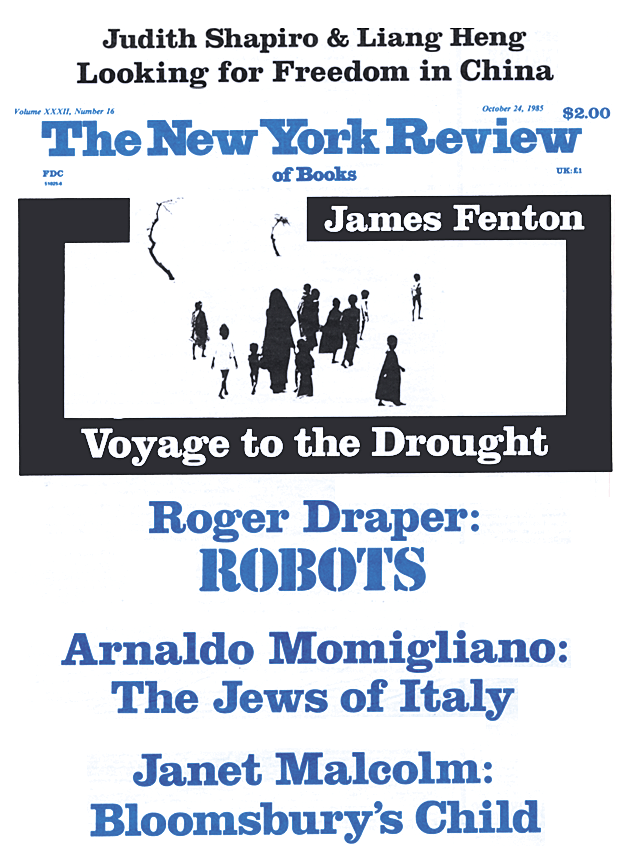To the Editors:
In response to the letter of K.R. Eissler, MD appealing for biographical data on Elizabeth Severn [NYR, June 13], I am able to volunteer the important information that a tape-recorded interview, undertaken with this woman some years ago, is to be found in the Sigmund Freud Archives in the Library of Congress in Washington. As I can assert on the authority of having a catalog in my possession, the tape is preserved, along with considerable other material on Freud and psychoanalysis, as item no. 118 in container no. 16 of Series D(Z) of the Freud-collection—all of it sealed, however, until the year 2017.
Of course, on account of the restriction, I am unable to say just how comprehensive is the interview. Over the course of time, though, in pursuing independent researches on Freud, I have had occasion to encounter copies of transcripts of a number of other interviews undertaken in the name of the Freud Archives; and I can assert on that basis that, as attempts at salvaging history, they leave a great deal to be desired. As a matter of fact, now for some years it has been one of my concerns to rectify their various shortcomings by means of further research, before death or the naive destruction of what are actually important documents renders such impossible. This work has been severely hampered, however, because data crucial to the pursuit of such urgent fact finding is being obstinately withheld by the Freud Archives and monopolized by certain of its officers (none of whom are competent as historians) at cost to free investigative enterprise.
Not only does such a policy of restriction inhibit further research and the consequent preservation of history—it also has the effect of crippling democratic scholarship, as Dr. Eissler pointed out as long ago as 1965 in his book Medical Orthodoxy and the Future of Psychoanalysis: “Indeed, the scientific investigation of religion is severely hampered in so far as important facts—here, as in so many other socially relevant areas—are actually withheld. It is quite likely that important parts of [a particular] theory about religion would be much more fully validated than is possible at present, if all the pertinent facts could be gathered without hindrance [from the Church]” (p. 413n).
I was instructed in April by Robert J. Kabcenell, MD, newly appointed to the position of Acting Secretary of the Freud Archives, that recently Dr. Eissler relinquished all his association with that institution. Thus—in accordance with the Archives’ by now in-famous policy of restriction—it is to be assumed that, like any other member of the public, he would automatically be denied access to the mentioned interview. That Dr. Eissler formerly had access to all the material in the Archives in his capacity as Secretary of the organization can be of no help to him now—we have repeated assurances from him that, out of discretion, he always refrained from inspecting the content of all the items entrusted to his care; also that the material was collected and sealed away in the interests of posterity on conditions such as precluded his own personal usage of any of it.
It is to be greatly deplored that a writer of such eminence, by now so late in age, will be denied—so, at any rate, one is bound to presume—all opportunity of ever examining the interview of Elizabeth Severn (a very important associate of Sandor Ferenczi) in his quest for biographical enlightenment on this woman. May I strongly urge Dr. Eissler, then, to write me expressing support for a petition that I propose launching for the purpose of protesting both the restrictions presently obtaining with respect to the bulk of all the historical material constituting the Sigmund Freud Archives, and the select and tendentious employment of this material by an ordained Freudian elite granted privileged access to it in numerous publications that have appeared during the course of the last thirty-five years (and which still, to this day, continue to appear). Should Dr. Eissler see fit to oblige me, he will find himself in excellent company. I am in receipt of letters from two of Freud’s grandchildren, Prof. Sophie Loewenstein and Mr. Clement Freud, M.P., in which they make perfectly clear their strong disapproval of the Freud Archives’ endeavour to inhibit investigation into their grandfather’s life and work.
Peter J. Swales
Rutgers University
New Brunswick, New Jersey
P.S. Checkmate.
This Issue
October 24, 1985


